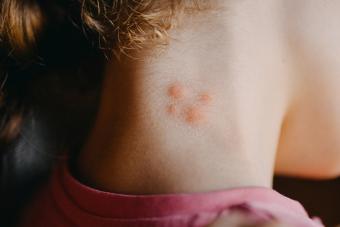
When a mosquito bites, it pierces the skin using its proboscis - six thin, needle-like mouthparts - which make it easy for the insect to suck up blood. As the mosquito feeds, it injects saliva into your skin. Within minutes, your immune system will release histamines in response to the bite. This is when you may begin to feel itchy and notice a puffy red or white bump. Most mosquito bites go away within 10 days, with peak itchiness from the first bite felt about 24 hours after the initial bite.
In some cases, an old mosquito bite may continue to itch well longer than is expected. This article explores reasons why old mosquito bites still itch.
Reasons Why Old Mosquito Bites Still Itch
If your mosquito bite still feels itchy and irritable more than 10 days past the day you were bitten, there are a few potential causes of this prolonged itchiness.
Your Mosquito Bite Has Become Infected
If you itched and scratched your mosquito bite to the point of bleeding, bacteria may have entered the open wound and caused an infection. The infection, known as cellulitis, occurs when bacteria enters the punctured skin from your hands or nails. Common signs that your mosquito bite has become infected include:
- Redness surrounding the mosquito bite
- Yellow pus oozing from the bite site
- Bite feels hot to the touch
- Fever
- Blisters
- Swollen lymph nodes
According to the Cleveland Clinic, welts or blisters from an infected mosquito bite can become as large as a mandarin orange or ping pong ball once they become infected. At-home treatments for mosquito bite infections may help clear up the infection. Follow these steps treat an infected mosquito bite at home:
- Wash the bite with soap and water
- Apply over-the-counter hydrocortisone cream to reduce itching and swelling
- Gently place ice packs on the area to reduce swelling and ease discomfort
- Reapply hydrocortisone cream every 4 hours as needed
In some cases, an infected mosquito bite may require medical attention. Contact your healthcare provider if you develop a fever of 100 degrees Fahrenheit or higher and/or if you notice red streaking lines that extend from the mosquito bite to other areas of the body. Your doctor may prescribe antibiotics or a stronger topical cream to help clear the infection.
It Is a Different Type of Insect Bite
Around the world, mosquitos are responsible for more bites than any other insect in the world. The American Mosquito Control Association states that there are 2,700 species of mosquitoes -- 176 species exist in the United States. So it's easy to understand why most people assume that annoyingly itchy insect bite was the work of a mosquito.
But of couse, mosquitos aren't the only insects that bite. Many other insects bite humans: black flies, wasps, ticks, fire ants, and chiggers, for example. Bites from different insects may appear similar and feel equally itchy at first, but how long the discomfort lasts varies from insect to insect.
- Black fly: 3-7 days
- Wasp stings: peak at 48 hours and last up to
- Tick: 1-2 days
- Fire ant: 3-10 days
- Chigger: 1-3 weeks
Most insect bites can be treated in the same way mosquito bites are treated: wash the area with soap and water and apply ice and hydrocortisone cream to the affected area. If your insect bite does not improve after using at-home remedies, talk to your healthcare provider.
Allergic Reaction/Skeeter Syndrome
Not everyone reacts to a mosquito bite the same way. Some people may hardly notice they've been bitten. Others have more severe allergic reactions and develop swelling, hives and intense itching. A severe allergic reaction to mosquito bites is known as Skeeter Syndrome, which is most common in young children and people who are immunocompromised. After a mosquito bite, people with Skeeter Syndrome will develop a fever and a large red welt about 8-10 hours after the bite. They may also have pain, blisters and skin that is hot to the touch at the site of the bite.
According to the Cleveland Clinic, people with Skeeter syndrome are allergic to polypeptides (proteins) in the mosquito's salvia. Most symptoms resolve within 3-10 days. Your healthcare provider may advise treatments including:
- Oral antihistamines such as Bendryl
- Topical hydrocortisone cream applied to the bite
- Over-the-counter pain relievers (e.g., ibuprofen, acetaminophen)
The Bite Develops Into Dermatofibroma
Dermatofibroma is a small, non-cancerous growth on the skin. Most commonly found on the legs, dermatofibroma is believed to occur after minor trauma to the skin, such as an insect bite. These growths are rare and are most common in people with autoimmune conditions. Dermatofibroma does not often cause symptoms, but some people may experience tenderness and itching.
A dermatologist can diagnose a dermatofibroma with a dermascopy - a magnifying tool used to closely examine skin spots and blemishes. Most dermatofibromas do not require treatment, though surgical removal is an option if the growth causes tenderness, pain and/or itching.
When to See Your Healthcare Provider
Most mosquito bites are not cause for worry and go away on their own within a week. Mosquito-borne diseases are spread by the bite of an infected mosquito, but are this is a rare occurrence in North America. Of the mosquito species in the U.S., only 12 carry diseases such as dengue, chikungunya, and Zika virus.
If your mosquito bite continues to itch and cause discomfort or is accompanied by other symptoms (e.g., fever) it may require attention from a medical professional. See your healthcare provider about a mosquito bite if you have:
- Fever
- Headache
- Body aches
- Signs of infection (e.g., pus, hot to the touch, red streaks surrounding the bite)







